International Technical Support Newsletter no 23, February 2025
- Launch of Twinning with Cambodia’s NIS
- Scoping Mission in Lesotho
- Closure and Conclusions of the Hakama II Project in Morocco
- Leadership Training in Official Statistics and Results-Based Management in Sub-Saharan Africa
- Support for Communication in Africa
- Webinars on Measuring Employment with the BCEAO
- Initial Collaborations with the National Statistical Institutes of Kenya and Rwanda
- Continued Developments and Tests of the New ERETES Version
- Continued Dissemination of ERETES in Africa and Latin America
- Workshops Organised as Part of the PAS II - ECOBUSAF and SOCSTAF Cooperation Projects
- Participation in the United Nations Statistical Commission for Africa
Launch of Twinning with Cambodia’s NIS
After the resident twinning adviser settled in Phnom Penh in May 2024 and an evaluation mission carried out in July by the coordinators of the three components of the twinning project with the Cambodian National Institute of Statistics (Ouvrir dans un nouvel ongletNIS), a new milestone was reached in December with the kick-off meeting.
Indeed, on 5 December, the launch of the EU twinning project “Enhancing the Quality of the Statistical System in Cambodia” was formalised at a ceremony chaired by the Cambodian Minister of Planning and attended by the Ambassador of the European Union, the French Ambassador and the Italian Honorary consul in Cambodia. This twinning project is being carried out by a consortium led by the Italian national statistical institute (Istat), including INSEE and the national statistical institutes of Lithuania and Poland.
Delegations from three of the four EU partner member states were present and were not only able to participate in the event and in Project coordination meetings, but also to get involved in technical support actions in their areas of responsibility. INSEE experts thus facilitated the first working sessions with their Cambodian contacts on the organisation of NIS and its role in the coordination of the National Statistical System, communication and data dissemination strategies, as well as how taking into account the user needs and promoting gender equality within the Institute.
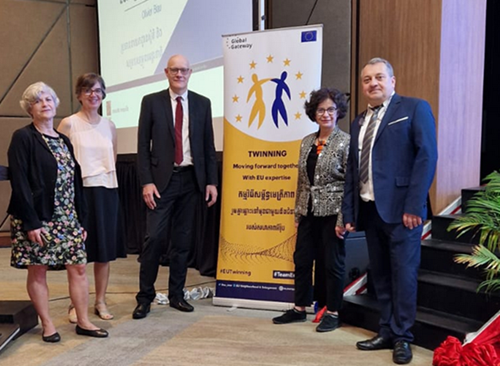
The INSEE delegation composed, from left to right, of Françoise Maurel,
Christine Lagarenne, Olivier Biau, Dominique Francoz and Patrick Hernandez
Scoping Mission in Lesotho
The European Union Delegation to the Kingdom of Lesotho asked Expertise France to contribute to a project, entitled Equitable Lesotho, aimed at reducing the various aspects of multidimensional poverty affecting the country’s most vulnerable populations. One of the components, being handled by UNICEF, aims at improving access to basic services, such as birth registration and sustainable energy solutions. For the other component, Expertise France turned to INSEE for support in strengthening the national statistical system: the goal is to increase the use of quality data and statistics on gender by the government and international partners in the design of policies and programmes.
In order to assess the material and human resources to be used over the duration of the project (2025–2028), a joint Expertise France/INSEE mission visited Maseru in November. Interviews have taken place with the management of the Ouvrir dans un nouvel onglet Bureau of Statistics, some representatives of Ministerial Statistical Offices (MSOs), technical and financial partners and some associations. Supplemented by remote discussions, their analysis, enriched by the examination of some structural documents (the National Strategy for the Development of Statistics, in particular), will be used to establish a detailed programme of activity and to define the composition and profile of the project team that will be responsible for its implementation from June 2025.
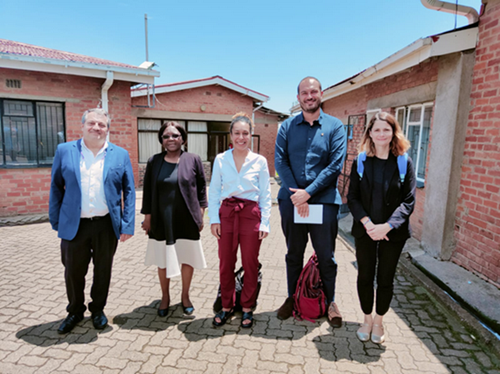
Expertise France/INSEE mission from right to left Cécile Valadier, Quentin Roy,
Tamara Larbi (Expertise France) and Patrick Hernandez (Insee) with Celina Molato
(Director of the Bureau of Statistics of Lesotho)
Closure and Conclusions of the Hakama II Project in Morocco
After four years of activity, the review of the European Ouvrir dans un nouvel ongletHakama II project was presented at a closing seminar in Rabat in November. Focused on public management efficiency and transparency and implemented by Expertise France, Hakama II included a statistical component handled by INSEE for the benefit of the Ouvrir dans un nouvel ongletHigh Commission for Planning (HCP) of Morocco.
Regional statistics, business statistics and mixed-mode household surveys were the backbone of this cooperation, the following results of which were emphasised :
- The completion of a territorial study by the Ouvrir dans un nouvel ongletRegional Directorate of Oujda and the strengthening of its capacity in this field;
- Support for the regional directorates by the Ouvrir dans un nouvel ongletRegional Directorate of Tangier for the implementation of the gradual automation of data exchanges with producers;
- The conduct of a survey on user satisfaction in relation to regional statistics by the Ouvrir dans un nouvel ongletRegional Directorate of Agadir ;
- A test of telephone interviewing in the Employment Survey ;
- Collaborative design of the first R programs for control automation on data collected as part of the enquête nationale sur les structures économiques (National Survey on Economic Structures).
All our thanks go to the HCP and Expertise France teams in Rabat, as well as to all INSEE experts, from both the Directorate-General and regional offices, who have enthusiastically taken part in the project.
Leadership Training in Official Statistics and Results-Based Management in Sub-Saharan Africa
At the request of the Economic and Statistical Observatory for Sub-Saharan Africa (Ouvrir dans un nouvel ongletAfristat), leadership awareness training on Official Statistics and results-based management was provided in September and November, respectively, to final year Master’s students from the National Statistics Schools of Abidjan and Dakar.
This initiative gives these two schools the opportunity to internalise related skills and add these themes to their training offer (initial, continuous and executive education).
Support for Communication in Africa
There is an increasing number of requests for support for external communication emanating from statistical institutes. In that respect, INSEE has worked with several institutions, starting with the Tunisian Ouvrir dans un nouvel ongletNational Institute of Statistics to define the framework of an editorial graphic charter and an update of publications to be carried out in 2025 as part of the European economic support project Ouvrir dans un nouvel ongletSavoirs éco en Tunisie.
Discussions were also held with Afristat to strengthen their institutional communication, as well as their communication with the general public. Finally, a mission to assess the current state of communication carried out to the National Institute for Statistics and Economic and Demographic Studies (Ouvrir dans un nouvel ongletINSEED) of Chad should lead to the establishment of a multi-annual action plan for the NSI encompassing every communication aspect.
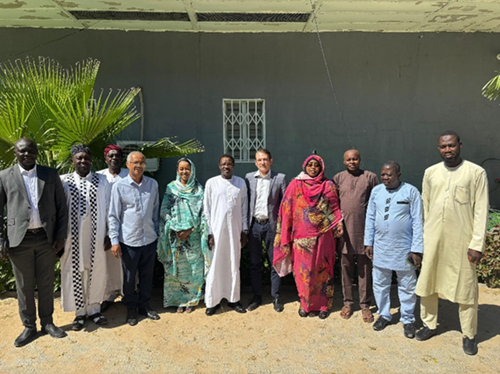
From left to right : Ramadji Madjadina, Djpeur Korodé Gérard, Ousmane Malloum, Abdou
Abdallah,
Halimé Ali Abbas, Dr Baradine Zakaria Moursal (INSEED), Olivier Gourdon (INSEE),
Nadjwa Mahamat Abdel-Bagui, Sanoussi Baradine Abdelkerim,
Pr Madjigoto Robert and Mbodou Alhadj (INSEED)
Webinars on Measuring Employment with the BCEAO
At the request of the Statistical Directorate of the Central Bank of West African States (Ouvrir dans un nouvel ongletBCEAO), a series of four webinars took place in October on measuring employment. These sessions featured presentations on the Labour Force survey that has been continuously carried out by INSEE since 2003, and on the Labour force activity and employment conditions survey conducted by the Directorate of Research, Economic Studies and Statistics (Ouvrir dans un nouvel ongletDARES) of the French Labour Ministry. To complete the overview on measuring employment in France, there was also a presentation on statistics produced using administrative data, including employment estimates. There was also a presentation on work enabling an analysis of the employment situation, including the general index of the employment outlook. Following these sessions, the BCEAO intends to carry out work to obtain aggregate indicators on employment for the entire West African Economic and Monetary Union.
Initial Collaborations with the National Statistical Institutes of Kenya and Rwanda
In 2024, INSEE established closer ties with the Kenya National Bureau of Statistics (Ouvrir dans un nouvel ongletKNBS) and the National Institute of Statistics of Rwanda (Ouvrir dans un nouvel ongletNISR), in order to identify potential areas for collaboration. INSEE shared its expertise in business registers with the KNBS. Over the course of three webinars, which took place between May and October, INSEE experts presented the French inter-administrative business register, Sirene, and the automatic coding methods, as well as the statistical directory of companies, Sirus. A session on group of companies profiling provided Kenyan statisticians with an overview. With the NISR, the focus has instead been on governance issues and, in particular, on consultations between producers and users of official statistics.
Continued Developments and Tests of the New ERETES Version
The work to update the Ouvrir dans un nouvel ongletERETES tool, used to assist in compiling national accounts, progressed well in the second half of 2024. One of the goals was to incorporate the recommendations resulting from the first two pilot missions carried out, in May, in Cameroon and Cape Verde. These missions focused on two essential projects: the wealth accounts and the semi-automatic balancing of resource-use balances.
Feedback from expert users, collected during the second technical workshop in Paris from 11 to 14 June, was also considered. This session brought together representatives of the national statistical institutes of four pilot countries, namely Cameroon, Cape Verde, Morocco and Senegal, as well as national accounts experts from Afristat, Statafric and the IMF.
Work on a third major project, the backcasting of annual national accounts, has also begun. This module will enable countries using ERETES to recalculate and disseminate long series of annual national accounts, which are aligned with the new methods defined during a base year change, more quickly. An initial mission was carried out for this project by INSEE in November, in Senegal.
Missions in the pilot countries, which are part of the implementation of the ECOBUSAF component of the Pan-African Statistics Program II (PAS II), will continue in 2025 with tests based on country-specific data, before the new version should be available by the end of the year.
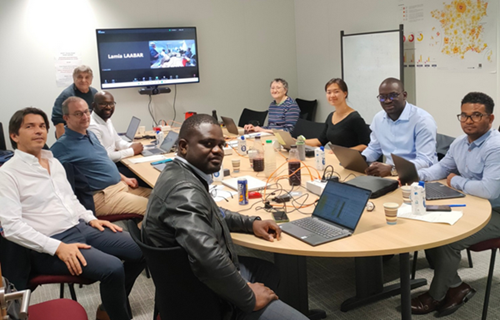
In-person workshop participants and trainers, from left to right :
Brice Kamsu (NSI of Cameroon), Alexandre Ailloud (France’s international cooperation
Technical Expert at Statafric), Charlotte Schiltz (retired from INSEE), Harouna Traoré
(INSEE), Thierry Robisson (Orion IT programmer), Sophie Bourrel and Alice Tchang (INSEE),
Khadim Sourang (National Agency of Statistics and Demography of Senegal),
José Dos Santos Fernandes (NSI of Cape Verde)
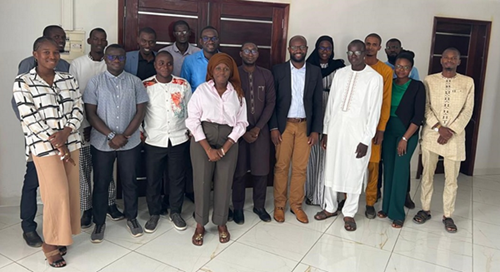
Harouna Traoré (INSEE, sixth from the left, front row) and part of
the national accounts team of the ANSD of Senegal
Continued Dissemination of ERETES in Africa and Latin America
In the second half of 2024, the introduction of ERETES continued in Liberia and Bolivia. In Liberia, the uploading of closed accounts has been completed and the crucial step of codifying data sources has begun. The mission, funded under the ECOBUSAF component of the PAS II project, was dedicated to data preparation, the final step before the adjustment and balancing work in the software interface. In Bolivia, the mission, following that of the project manager and the study visit of two Bolivian accountants to their Peruvian counterparts, made it possible to resolve the issue of non-alignment between the classifications of sectors of activity and products. This study visit gave them an opportunity to gain a better understanding of the importance of clearly defining the classifications and data sources to be uploaded into ERETES, to see an example of the distribution of tasks within a team that has been using the software for years and to get a better idea of how a “round” of accounts, including summary, is conducted. The INSEE mission focused on this stage of identifying Bolivian data sources (which can be raw but also already reworked) and starting their codification.
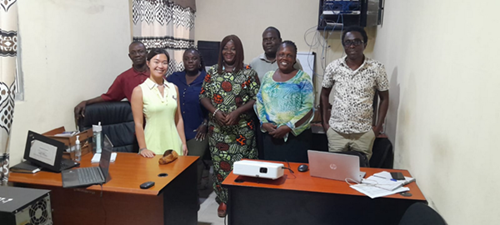
Alice Tchang (INSEE, second from the left) and part of
the Liberian national accounts team
Workshops Organised as Part of the PAS II - ECOBUSAF and SOCSTAF Cooperation Projects
In addition to the mission to introduce ERETES in Liberia and the mission to Senegal concerning the trial of a backcasting module, the ECOBUSAF and SOCSTAF project activities in the second half of 2024 focused on the organisation of two face-to-face workshops in Tunis.
INSEE, working in close collaboration with Statafric, the Statistical Institute of the African Union, organised a workshop on tourism satellite accounts from 8 to 10 October.
Following on from two virtual workshops held in the first half of 2024, this session brought together representatives from seven African countries that already have experience in compiling tourism satellite accounts: Botswana, Cameroon, Cape Verde, Mauritius, Morocco, Uganda and Tunisia.
The workshop included presentations by INSEE on the construction of tourism satellite accounts: concepts, implementation and evaluation, as well as on methods of estimating employment linked to tourism - which is a particularly important topic for African participants. The latter also had the opportunity to share their own experiences and exchange good practices. A working document has been drawn up to assist countries wishing to begin the construction of a tourism satellite account.
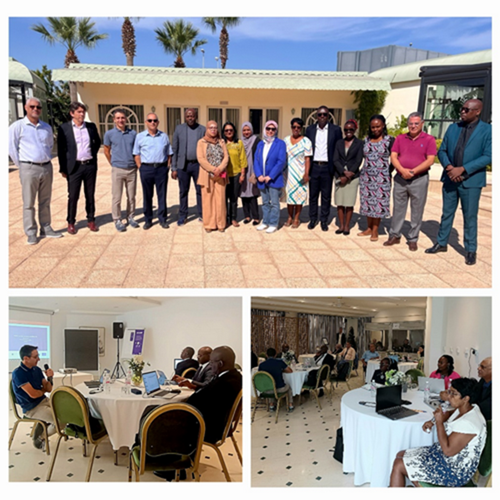
David Levy (INSEE, third from the left at the top) and the participants of the workshop on tourism satellite accounts
From 14 to 17 October, as part of the PAS II-SOCSTAF project on social statistics, INSEE and Statistics Poland jointly organised a workshop on the topic of population censuses. It brought together representatives from Eswatini, Lesotho, Morocco, Namibia and Tunisia, countries that had attended the online workshops organized in 2023 by Ouvrir dans un nouvel onglet Statistics Poland.This workshop focused on post-census operations. Participants were able to share their experiences in this area.
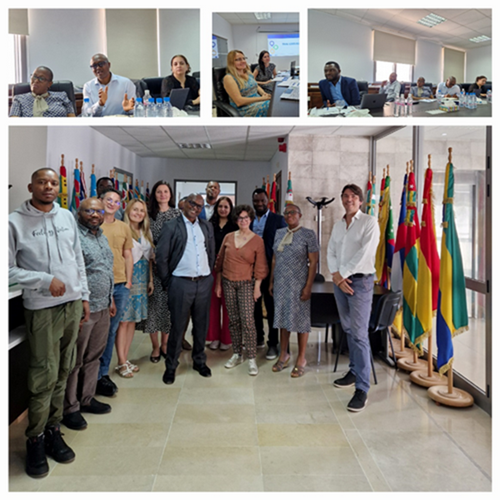
Participants in the workshop on population censuses,
Guillaume Poirel (Expertise France, third from the left),
Anna Slawinska and Dorota Paraluk (Statistics Poland, fourth and fifth),
Dominique Francoz (Insee, ninth) and
Alexandre Ailloud (France’s international cooperation Technical Expert at Statafric,
right).
Participation in the United Nations Statistical Commission for Africa
INSEE took part in the ninth session of the Statistical Commission for Africa and its side events (Forum on African Statistical Development – FASDEV) organised by the United Nations Economic Commission for Africa (UNECA) from 28 October to 1 November in Addis Ababa, Ethiopia.
Its representative was able to present the results of the programmes recipients of European PAS II-ECOBUSAF and SOCSTAF funding in a session of the FASDEV forum focused on partnerships to improve the African statistical system. Experiences across the countries represented in terms of the organisation and funding of NSIs were also discussed.
The use of administrative data for statistical purposes was one of the major themes discussed at these meetings. For this purpose, a strategy and a road map were proposed to assist countries in modernising their systems for processing administrative data for statistical purposes.
A side event on the use of hackathons to strengthen the capacities of NSIs and raise awareness among the public (especially students and academics) on the use of statistics was also organised by the INSEE representative. It provided an opportunity to present the experience of the Hackathon organised in April 2024 as part of the ECOBUSAF component, which focused on the theme of “Exposure of African agriculture to climate change”. The session consisted of a roundtable in which four speakers shared their experiences from various points of view: the benefits for an NSI as a participant or as an organiser or for a statistical school. This session gave birth to many ideas, from which recommendations were developed to facilitate the organisation of hackathons in the NSIs: the development of common guidelines, the establishment and leading of an African network of data scientists to facilitate the sharing of experiences, the annual organisation of an African hackathon or the creation, under the aegis of a pan-African institution (Statafric or UNECA), of a group of experts on data science issues.
Next step: an initial version of the guidelines will be drafted during the study visit that the winners of the Hackathon will go on, which will take place at INSEE’s Directorate-General in February 2025. To be continued !
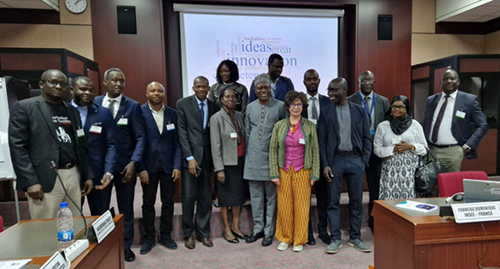
Participants in the side event on the use of hackathons and
Dominique Francoz (INSEE, sixth from the right)


